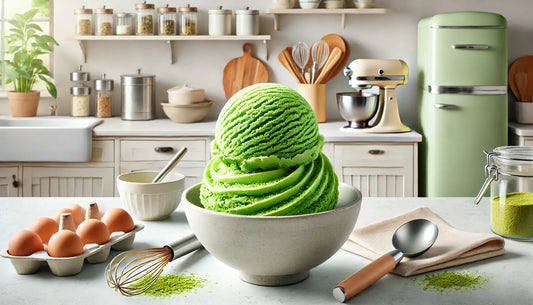Is green tea acidic? 🤔
You’ve come to the right place to find out! We’re going to be uncovering the secrets of the acid in green tea to find out whether green tea is acidic or alkaline.
We’ll also talk about is green tea good for acid reflux and how to change the green tea acid content.
Let’s get started! 🍋
Is Green Tea Acidic? Watch This Video to Find Out!
Is green tea acidic
So right off the bat, let’s just answer the question is green tea acidic. Green tea is considered to be mildly acidic, meaning more acidic than water but less acidic than other things you might drink like coffee or red wine.
While the acid in green tea can vary based on a number of different factors, it generally has a pH between 6.5 and 7.5. Let’s talk about what that means in the next section.
Why is green tea acidic

So now that we have talked about the acid in green tea, let’s discuss why is green tea acid. You’ll notice before we mentioned “pH” but what does that mean exactly?
By the way, if you want to specifically learn about the acidity of matcha, this is probably the better article for you 👉 Is Matcha Acidic? A Tea Expert Solves the pH Puzzle
pH of Green Tea
The pH scale is like a special ruler for taste. It goes from 0 to 14. 7 is right in the middle and is "neutral," like water. Less than 7 is "sour" (acidic), such as lemons. More than 7 is "bitter" (alkaline), like baking soda. Scientists use it to understand how strong acids and bases are.
You’ll notice that green tea can vary between slightly acidic and slightly basic, which is why it has a balance of these bitter and slightly sour flavors.
The Lowest acid in green tea
If you are looking for the least acidic green tea, here are 3 of our favorites:
Bancha
Bancha is a Japanese green tea made from older tea leaves. It is known for its mild flavor and lower caffeine content, which can make it less likely to trigger acid reflux symptoms.
If you want to learn more about bancha tea, we put together a complete guide here 👉 All you need to know About Bancha
Hojicha
Hojicha is another Japanese green tea, but it's unique in that the tea leaves are roasted. Roasting reduces the tea's caffeine content and may contribute to a milder, less acidic flavor.
Want to learn more about the delicious roasted tea that is Hojicha? Then this is the perfect article for you 👉 Everything You Need to Know About Hojicha
Genmaicha
Genmaicha is a blend of green tea and roasted brown rice. The rice adds a toasty and somewhat nutty flavor, which can make it gentler on the stomach. It's often considered a more soothing option.
Want to become a master of all things Genmaicha? You might like this article 👉 Essential Genmaicha Guide by Japanese Tea Experts
What impacts the acid in green tea?
The question of is green tea acid can depend on a few different factors. Let’s briefly go through 4 different variables that can impact whether green tea is acidic or not.
Brewing Time and Temperature
The brewing process plays a crucial role in determining the pH of your tea. Longer brewing times and higher water temperatures can lead to the release of more acidic compounds, such as tannins and polyphenols, making the tea taste more astringent and potentially more acidic.
Shorter brewing times and lower temperatures can yield a milder, less acidic cup of tea. If you want to learn how to make delicious, less acidic cups of tea, you may appreciate this guide 👉 How to Make Loose Leaf Tea explained by Tea experts
Water Source and Quality
The source and quality of the water you use to brew your tea can influence its acidity. Water with a high mineral content, such as hard water, can make tea taste more alkaline. Softer water may yield a milder, potentially more acidic taste.
Using purified or filtered water can help control the water's mineral content and maintain a consistent tea flavor.
Tea Leaf Age and Quality
The age and quality of tea leaves can impact their acidity. Fresh, high-quality tea leaves often have a brighter and more complex flavor profile, which includes a balance of acidity and sweetness.
As tea leaves age or are of lower quality, they may produce a less balanced and potentially more acidic taste.
Additives and Flavorings
Ingredients added to the tea, such as lemon, milk, or sweeteners, can significantly alter its acidity. Lemon juice, for example, is acidic and can lower the pH of the tea, making it taste more tart.
Milk, on the other hand, can slightly increase the pH and reduce the perceived acidity. Sweeteners, like sugar or honey, can add sweetness to counterbalance acidity, affecting the overall taste of the tea. The choice of additives can personalize your tea's flavor profile.
Other types of acid in green tea
When we talk about the acid in green tea, it might be a bit confusing because we also talk about green tea as having “amino acids”. Amino acids are indeed classified as acids, but they are generally considered to be weak acids.
Amino acids are the building blocks of proteins and contain both an amino group (NH2) and a carboxyl group (COOH) in their chemical structure. The presence of the carboxyl group makes them acidic because they can release a hydrogen ion (H+) when dissolved in water, which is a characteristic of acids.
Is green tea acidic or alkaline
So is green tea alkaline or acidic then? The answer is both! Certain teas can be slightly alkaline and certain teas can be slightly acidic. The important thing to remember is that it is very close to neutral, meaning it won’t impact your pH balance too much either way.
How to control whether green tea is acidic or alkaline
Whether green tea is acidic or alkaline can depend on how you prepare the tea. If you want more acidity in your tea, you can brew it at higher temperatures and extract more of the polyphenols and tannins. If you want a less acidic green tea, you can brew it at a lower temperature for a shorter time.
Is green tea bad for acid reflux
So now that we have talked about green tea is alkaline or acidic, let’s discuss some green tea acid reflux questions. We’ll start by answering is green tea acid forming when it gets into the gut and how green tea and acid reflux can coexist.
What is acid reflux?
Acid reflux is essentially when stomach acid spills up into the esophagus, which can trigger heartburn, coughing and difficulty swallowing. As you can see, the question of is green tea acidic and the question of is green tea bad for acid reflux are completely different.
Is green tea acid forming
So we’ve talked about why green tea is alkaline or acidic, but we haven’t discussed whether or not it can worsen the symptoms of acid reflux. It is generally considered one of the safer beverages when it comes to acid reflux, but there are a couple of things you’ll want to look out for.
Tea contains a moderate amount of caffeine, which can actually relax the muscle that keeps stomach acid out of the esophagus. Tannins are also present in teas and may cause some people to produce more stomach acid and stomach ache.
Is Green tea good for acid reflux
Before we end our conversation on green tea and acid reflux, let’s talk about why green tea might be good for acid reflux. While there are a few green tea acid reflux complications, there are also some benefits as well!
Why is green tea good for acid reflux?
Green tea is rich in antioxidants and polyphenols, such as epigallocatechin gallate (EGCG). These compounds have anti-inflammatory properties, which can help reduce inflammation in the esophagus and alleviate discomfort associated with acid reflux.
Green tea has also been traditionally used in some cultures to aid in digestion. It may help soothe the stomach and support the digestive process, potentially reducing the likelihood of acid reflux episodes.
Is green tea acidic? The Final Verdict
So is green tea acidic? Technically yes, but you really have nothing to worry about. As long as you drink green tea in moderation and on a full stomach, you shouldn’t have any issues. Green tea is neutral to moderately acidic and it won’t aggregate the symptoms of acid reflux.
Another concern when it comes to the acidity in green tea is dental health. If you want to learn more about that, you should read these articles
👉 Does Matcha Stain Teeth? Here’s What to do About it (for matcha lovers)
👉 Does Green Tea Stain Your Teeth? Find The Answer Here! (for green tea lovers)







